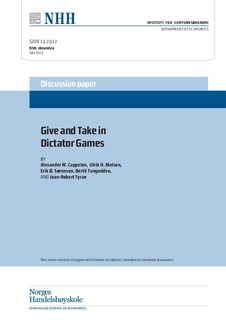| dc.contributor.author | Cappelen, Alexander W. | |
| dc.contributor.author | Nielsen, Ulrik H. | |
| dc.contributor.author | Sørensen, Erik Ø. | |
| dc.contributor.author | Tungodden, Bertil | |
| dc.contributor.author | Tyran, Jean-Robert | |
| dc.date.accessioned | 2013-03-13T09:26:24Z | |
| dc.date.available | 2013-03-13T09:26:24Z | |
| dc.date.issued | 2012-07 | |
| dc.identifier.issn | 0804-6824 | |
| dc.identifier.uri | http://hdl.handle.net/11250/163434 | |
| dc.description.abstract | It has been shown that participants in the dictator game are less willing to give
money to the other participant when their choice set also includes the option to
take money. We examine whether this effect is due to the choice set providing a
signal about entitlements in a setting where entitlements initially may be considered
unclear. We find that the share of positive transfers depends on the choice
set even when there is no uncertainty about entitlements, and that this choice-set
effect is robust across a heterogenous group of participants recruited from the
general adult population in Denmark. The findings are consistent with dictator
giving partly being motivated by a desire to signal that one is not entirely selfish
or by a desire to follow a social norm that is choice-set dependent. | no_NO |
| dc.language.iso | eng | no_NO |
| dc.publisher | Norwegian School of Economics, Department of Economics | no_NO |
| dc.relation.ispartofseries | Discussion paper;14/2012 | |
| dc.title | Give and take in dictator games | no_NO |
| dc.type | Working paper | no_NO |
| dc.subject.nsi | VDP::Social science: 200::Economics: 210::Economics: 212 | no_NO |
